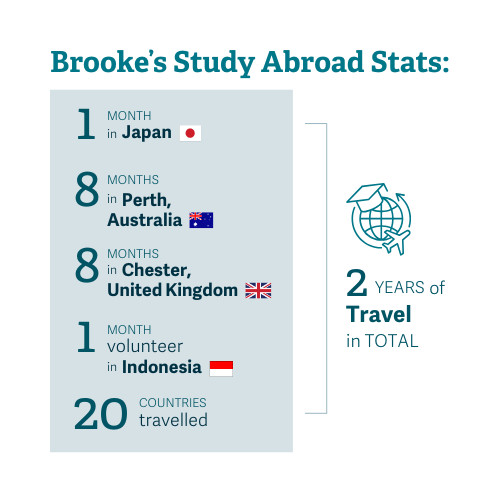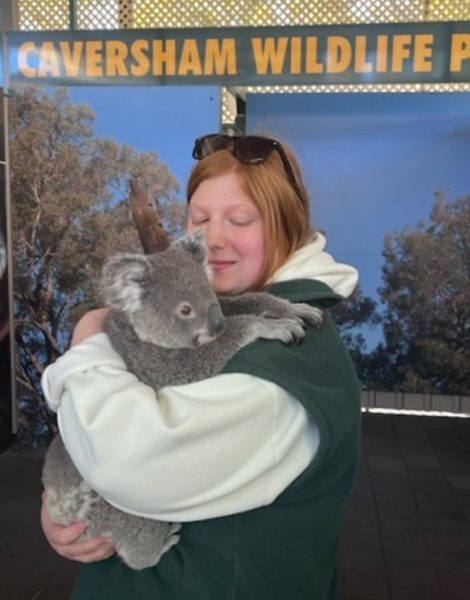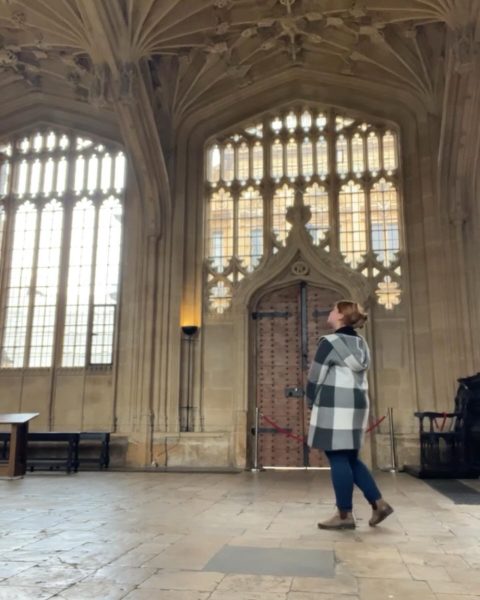As a Study Abroad Legacy Ambassador and a prolific traveller, Brooke Enders has become an invaluable resource to staff and students alike on all things Study Abroad. She has also taken the initiative to improve programming for 2SLGBTQPIA+ students by examining the unique challenges they face and suggesting ways to ensure a safer travelling experience, earning her a Peer Mentor of the Month award.
“Brooke has shone in this leadership role,” says Norah Vander Haas, who nominated her for the award. “She helps organize our group, creates effective communication channels, leads activities and teaches the ambassadors about branding and outreach methods. She’s always the first to respond to any request for help. She does everything with a positive, friendly attitude and a warm smile.”
Upon learning she’d won, Enders says she was shocked, excited and honoured: “I love my team so much; the recognition really means a lot. Intercultural learning has always been a priority; it was really important for me to learn more about different cultures, languages and mindsets.”

Enders loves chatting about her time abroad but notes she struggles to fully capture her story as there are so many places, spaces, people, flavours and feelings, and all the highs and lows in between.
“It’s also been hard to articulate the feeling of leaving home and then coming back as well,” she says. “I’ve visited over 20 countries during that time period, so each day within those two years is a story unto itself. I notice my story changes a little bit every time – partly because there’s just so much information, but also because I’ve had more time to process it, or I see the narrative differently as I age and evolve.”
Travelling is often about responding to a lot of data in real time. You’re running to and from airports, train stations and taxis; you’re navigating, wayfinding, getting lost, meeting new people, staying in new places and packing a bag that only seems to get heavier as time passes. Enders notes that while it’s easy to get swept up in the sensory experiences, you come crashing into the most fundamental of laws: wherever you go, there you are. And while you’re stuck with yourself amid all these adventures, it’s almost a certainty you’ll change by trip’s end.
“We always tell students: ‘You won’t come back the same person,” she says with a laugh. “I know I didn’t.”
It’s a pleasant surprise to those closest to Enders that she has been on so many out-of-comfort-zone adventures. She remembers being a “very anxious child” and noted that class presentations or even one-on-one conversations would make her blush with nervousness, which made her feel even more self-conscious.
“When I came back from my first trip, my Study Abroad manager said, ‘You’re a completely different person!’ I am much more outgoing now, and I like to think it’s all the experiences I had while studying abroad. The achievements and challenges of travel provide an education in adaptability, humility, patience, empathy and dealing with the discomfort of the unknown. It’s an experience of navigating, engaging and witnessing that opens your heart, mind and worldview.”
Enders first went abroad just two days after her 18th birthday.
“I packed up my entire life into two suitcases and moved to Perth, Australia —the most isolated metropolis in the world, located on the other side of the planet,” she says. “Having grown up on a 10-acre farm without neighbours, being in a big city apartment building with sirens blaring all the time, traffic noise and people running up and down the hallway was probably the biggest culture shock for me. Then again, further down the track, I think I felt the most out of my element when I volunteered in a rural Indonesian village with about 100 – 200 people. Your comfort zone has a way of shapeshifting over time.”

Enders cuddling a koala in Australia.
One of the challenges of studying abroad (aside from the wherever you go, there you are debacle) is the danger of not living up to impossibly high expectations. Enders believes it’s better to accept the trip may be good, bad and/or ugly well in advance.
“World travel or studying abroad is so glamorized, especially on social media,” she says. “If you think it’s going to be like this perfect, picturesque Emily in Paris type experience, you’ll quickly realize that’s not how it works. Things will happen. Flights getting cancelled, trains leaving early and bags getting lost – all sorts of things happened to me. I once got locked out of my dorm room for 24 hours and had to sleep in the bathroom. It was awful, but it’s important to remember the good is going to outweigh the bad, those bad moments are going to make great stories and you’re going to realize those bad moments actually made you more resilient and helped you grow.”
Enders also notes that cultural stereotypes may shape expectations and can lead to disappointment.
“Say, you go to Australia, you may think it’s going to be sunny and surfy, and you’re going to be living every day on the beach. Well, I went to Australia in winter. I didn’t pack enough jackets. I was freezing the entire time I was there. Some beach party that was,” she says, laughing.
The Study Abroad department always considers these experiences and perceptions to ensure a comprehensive safety network of emotional and academic support is in place before, during and after the trip, including panel discussions and info sessions.
“It’s important to highlight the potential for learning difficulties you may experience when you’re abroad,” says Enders. “You are in a different education system. It’s not going to be the same. Professors have different expectations for you. For me, in Japan, the workload felt light. Then in England, I felt like I was so far behind.”
As a neurodivergent traveller, Enders understands that experiencing jet lag, time differences, disrupted routines and sensory overload can slow or impair executive functioning and cognitive capacity. At times, her mental health felt taxed and her energy drained. Factor in any feelings of homesickness and/or loneliness, and you could have a real crisis on your hands. Those experiences, always paired with strategies and suggestions, provide honest and authentic insights that enable more realistic and compassionate planning, preparing a prospective traveller to expect the unexpected.

Enders loved being in nature but also marvelled at the architecture.
“I often tell inbound and outbound exchanges the first month is probably going to be the hardest,” she says. “You’re going to hate it, you’re going to love it, and both things can be true at once. You’re going to feel all the feelings. Take time for yourself and sit with it. Soon enough, you’ll realize, ‘Oh, this is not so bad, it’s actually pretty cool.”
While Study Abroad reps often recommend saying yes to every opportunity within the first couple of weeks before committing to a routine, they also encourage you to honour what you know about yourself.
“You will grow over time, but not change on a cellular level,” says Enders. “Yes, I’ve become more outgoing, but as an introvert, I still need my ‘me time.’ It’s okay to take a step back to decompress. Sometimes I’d put my headphones in, listen to music for a couple of minutes, detach, take some deep breaths and then reconnect once I’m feeling more grounded.”
Most days, Enders would journal for about 20 minutes or take a photo, which helped her process more easily on the other side of the adventure.
“Study Abroad is quite a surreal experience, and a lot of times people don’t fully compute the magnitude of it until they actually come home. I struggled more with coming home than going abroad because I really didn’t want to leave any experience.”
Enders will be returning to Japan, this time with her family in tow. “We’re going to the rural communities where my friends live. They’re going to share their homes with us, which will be lovely. After that, I’m hoping to complete a master’s program and engage in more intercultural learning somewhere in Europe.”
Brooke’s tips for Study Abroad success:
- Start with a conversation. “Ambassadors can help reduce barriers, explain the application process, explore options and provide support. Please feel free to talk to us when you see us out and about on campus. We are there to help!”
- Don’t wait for friends before exploring. “There are many fun and safe options for solo travel. Maybe you’ll find friends along the way!”
- Let travel change your life and your major.“I started as a psychology major, but I loved this publishing course in the U.K. so much that I shifted to a double-major in psychology and English literature.”
- Study Abroad is for everyone. “People might think that Study Abroad isn’t for them for a multitude of reasons, and most of the time that’s not true. We do our best to accommodate everyone.”
- Financial support is available. “There were many scholarships and supports in place that made it really easy for me to go.”
- Take a LEAP. “If you can’t swing being a globetrotter just yet, there are plenty of fun regional travel opportunities through LEAP. There’s a persistent rumour that it’s just for international students, but all are welcome. Many people find friends through LEAP.”
- Follow Study Abroad on social media. “We often post fun clips of our various experiences and provide advice on how to travel safely and affordably.”
The TRU Peer Leader of the Month Award recognizes one or two peer leader(s) each month, from September to April, for their contributions to mentees, peer leader groups, the TRU community and/or the broader Kamloops community. This award recognizes the diverse contributions made by peer leaders and rewards students who exemplify passion, leadership, resilience, excellence, creativity and empathy.

